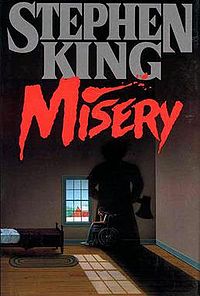Misery
by Stephen King
Paul Sheldon, the author of the best-selling series of Victorian-era romance novels featuring the character Misery Chastain, has finished the series' final installment, Misery's Child, in which Misery is killed off. After completing the manuscript for his new crime novel, Fast Cars, which he hopes will receive serious literary acclaim, Paul acts on an alcohol-induced impulse to drive to Los Angeles instead of flying back home to New York City. He is caught in a snowstorm in a remote section of Colorado and crashes his car. He awakens to find that he has been rescued by Annie Wilkes, a local former nurse who is a devoted fan of the Misery series. She keeps Paul in her guest bedroom and refuses to take him to the hospital despite his severely broken legs, and nurses him herself using her illicit stash of codeine-based painkillers, to which Paul quickly becomes addicted; Annie withholds pills in order to threaten and manipulate Paul. She begins reading Misery's Child and coerces permission to read the manuscript of Fast Cars, but disapproves of the darker subject matter and profanity. Paul soon assesses that Annie is mentally unstable; she is prone to trailing off into catatonic episodes and has bouts of unreasonable rage. When she learns of Misery's death, she leaves Paul alone in her house for over two days, depriving him of food, water, and painkillers.
Upon Annie's return, she forces a weakened Paul to burn the manuscript for Fast Cars in exchange for his painkillers. Annie sets up an office for Paul – consisting of an antique Royal typewriter with a non-functional N-key, writing paper and a wheelchair – for the purpose of writing a new Misery novel that will bring the character back from the dead. Biding his time and likening himself to Sheherezade, Paul begins a new book, Misery's Return, and allows Annie to read the work in progress and fill in the missing Ns. The text includes excerpts of the new book as Paul writes.
Paul manages to escape his room using his wheelchair on several different occasions, searching for more painkillers and exploring the house. He discovers a scrapbook full of newspaper clippings that reveal Annie to be a serial killer; her victims included a neighboring family, her own father, her college roommate, a hitchhiker with whom she had a brief fling, and, while she worked as a nurse, many elderly or critically injured patients and eleven infants, the last resulting in her standing trial but being acquitted in Denver. Annie reveals that she knows Paul has been leaving his room, then punishes him by cutting off his foot with an axe and cauterizing his ankle with a blowtorch, "hobbling" him. Months pass; after Paul complains that more typewriter keys have broken and refuses to tell Annie how the novel ends before he has written it, she cuts off his thumb with an electric knife.
A state trooper arrives at Annie's house in search of Paul. When Paul attempts to alert him, Annie murders the officer by running him over with her riding lawnmower. The disappearance of the state trooper results in attention on Annie from law enforcement and the media. Annie relocates Paul to the basement and it becomes clear that she does not intend to let him live. After Misery's Return is finished, Paul lights a decoy copy of the manuscript on fire, which Annie attempts to save. He engages her in a violent struggle which renders her unconscious. Paul is able to alert the police when they return in search of the dead officer. Annie is found dead from her injuries in the barn, apparently on her way to murder Paul with a chainsaw.
After Paul has returned to New York, Misery's Return is set to be published and becomes an international bestseller due to the interest in the circumstances it was written under. Paul resists the suggestion to write a nonfiction account of his own experiences. He is able to walk with a prothesis but suffers nightmares about Annie and continues to have withdrawal from painkillers, copes with alcoholism, and struggles with writer's block. When Paul gains random inspiration to write a new story, he weeps both for his shattered life and in the joy that he is finally able to write again.
